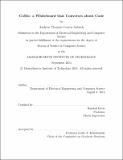| dc.contributor.advisor | Randall Davis. | en_US |
| dc.contributor.author | Sabisch, Andrew Thomas Correa | en_US |
| dc.contributor.other | Massachusetts Institute of Technology. Department of Electrical Engineering and Computer Science. | en_US |
| dc.date.accessioned | 2015-02-05T15:58:31Z | |
| dc.date.available | 2015-02-05T15:58:31Z | |
| dc.date.copyright | 2014 | en_US |
| dc.date.issued | 2014 | en_US |
| dc.identifier.uri | http://hdl.handle.net/1721.1/93777 | |
| dc.description | Thesis: Sc. D., Massachusetts Institute of Technology, Department of Electrical Engineering and Computer Science, 2014. | en_US |
| dc.description | This electronic version was submitted by the student author. The certified thesis is available in the Institute Archives and Special Collections. | en_US |
| dc.description | Cataloged from student-submitted PDF version of thesis. | en_US |
| dc.description | Includes bibliographical references (pages 181-184). | en_US |
| dc.description.abstract | Software engineers routinely solve problems by brainstorming at whiteboards. Among other modes, they communicate with speech and sketch. Unfortunately, the whiteboard plays the role of a passive medium. It serves only as a place to draw. But what if it could engage in the conversation, even to a limited degree? Ideally it would help guide the engineers to a solution by being an active participant in the conversation. This thesis presents an early version of that vision: CoMo, a whiteboard that converses about code. CoMo is capable of engaging its user in a constrained mixed-initiative symmetric-multimodal conversation about a data structure manipulation. When it understands the data structure, it uses a code synthesis system to generate functioning C code. It can successfully hold a limited conversation and synthesize code for 50 manipulations on 8 data structures. This thesis further presents findings from an observational user study that helped guide the interaction with CoMo. Finally, this thesis presents the mixed-initiative code-generation framework that CoMo implements to achieve its interaction, and the insights about having limited natural conversations about data structure manipulations that were gleaned while creating the framework. | en_US |
| dc.description.statementofresponsibility | by Andrew Thomas Correa Sabisch. | en_US |
| dc.format.extent | 184 pages | en_US |
| dc.language.iso | eng | en_US |
| dc.publisher | Massachusetts Institute of Technology | en_US |
| dc.rights | M.I.T. theses are protected by copyright. They may be viewed from this source for any purpose, but reproduction or distribution in any format is prohibited without written permission. See provided URL for inquiries about permission. | en_US |
| dc.rights.uri | http://dspace.mit.edu/handle/1721.1/7582 | en_US |
| dc.subject | Electrical Engineering and Computer Science. | en_US |
| dc.title | CoMo : a whiteboard that converses about code | en_US |
| dc.type | Thesis | en_US |
| dc.description.degree | Sc. D. | en_US |
| dc.contributor.department | Massachusetts Institute of Technology. Department of Electrical Engineering and Computer Science | |
| dc.identifier.oclc | 900731297 | en_US |
